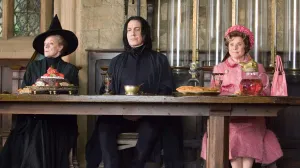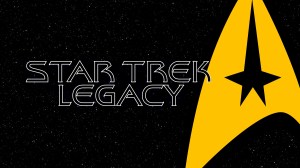
With just three episodes left in the season, The Flash has brought on a new director to helm this week’s episode: geek icon Kevin Smith, a huge fan of the series, who had the unenviable task of joining the show just in time to film an episode where the lead character…is dead.
Videos by ComicBook.com
At the end of last week’s episode of The Flash, in an attempt to restore Barry’s powers it seemed as though he’d died — but as many fans imagined, he has merely joined the Speed Force, and this week’s episode will follow him as he learns the nature of the Speed Force and tries to journey back to life.
Smith joined ComicBook.com to talk about this week’s episode.
You’ve said in the past that you don’t feel like your skillset would really be suited to a superhero project. Has working on The Flash changed your perspective at all?
Absolutely, but not so much that I would go make a comic book movie.
Listen, the speed of The Flash — no pun intended — is probably my speed. When you’re doing a comic book movie, you’ve got two hours generally to set up an origin, or even if you’re a sequel you’ve still got to do some more story work. You rarely get to do a lot of character stuff.
Iron Man is an exception in terms of secret origin films because you spend the whole second act with him in a workshop figuring himself out. It’s a rare and wonderful beast like that. But generally in comic book films, you don’t get a ton of time to get into character development stuff. It’s all about spectacle. You’ve got to deliver something that makes people want to get out of their house and go to the movies: building falling downs, fights, s–t like that.
On The Flash, you’ve got a series where they’ve got 23 episodes and they get to really build character over that, and they don’t have to rush. it’s a leisurely pace. You don’t have to do things in your episode of The Flash to make people understand, “okay, there’s this guy who’s been hit with lightning and chemicals and suddenly he can run fast. He lost his mom…” they’ve got all that. They get all that story leading up to your episode, so all you have to do is just take care of your hour.
Add to that the level of spectacle that they do, since it’s only like a 42-minute episode, probably only a quarter of that is going to be the special effects, the stuff that I’m always uncomfortable with or the stuff that I’m least adept at doing.
So it kind of felt like when I was coming in on The Flash, the three pillars on which they’ve built the show — heart, humor, and spectacle — heart and humor, I can pull off. That’s my bread and butter. Usually my third pillar is d–k jokes. But if you take that away and replace it with spectacule, that’s what always has be going, “ehh, I don’t know if I can do this.” But the good news is, they’re not doing two hours of spectacle.
And the good news, too, is that you don’t have to dream up this stuff or create the stuff yourself. Everyone has their department on the show and everyone has what they do. Armen [Kevorkian], who’s in charge of the special effects on the show and who directed the episode before mine, he’s the guy who’s got to figure out what the Speed Force looks like and stuff.
Your position as director is one of opinion and suggestion — and also cheerleading, and that’s what I brought to it in a big, bad way. I was so f–king enthusiastic, man. It rubs off; it’s infectious. I was always worried it’d be irritating for people, like “Jesus, this guy likes the show too much.” But they all like the show, too, so they were happy to have an outsider in there who’s such a fan.
At one point, we were driving around in a locations van and they’re like “Anybody want a coffee?” And I was like, “Let’s go to Jitters. I want a ‘Flash.’” And the locations dude was like, “It’s really nice to have somebody who’s an actual fan of the show on the show. It’s weird that you know the coffee is called ‘The Flash.’ And it’s because I live for this s–t. I watch it, it’s my entertainment.
So I’m in there not going “Let me show you how to make this f—ing show.” They know how to make it, as they do well every week. And I didn’t go up there going, “I want to put my signature on it.”
Jason Mewes is in this episode, and at one point I fought his casting becuase I was like, “I want this show to not stand out. I want people to not go ‘Oh, Kevin Smith directed this.’” Because I came up wanting to do The Flash, not “Kevin Smith’s The Flash.” So I almost talked him out of it — I was like, “you know, we probably should keep it Jay-free.” But he’s such a fan of The CW in general — that show particularly, but all of The CW shows, particularly the Berlanti shows, that it would have been so f—ed up for me to be like, “Dude, I just want this to be pure, so I’m leaving you out of it.” So the nice thing is, he’s in there, but he doesn’t distract that much. Just a fun little kind of cameo. But there was a moment where I thought about cutting my boy out of it, and he was crestfallen; he was like “They literally wrote me into a show. I live for these shows!”
I’ve seen Jason cry twice in his life: once when his daughter was born last year — when Logan was born; he named her after Wolverine; and once when I was like, “Dude you’re going to be on The CW.” Like, he was bawling. And at one point I almost told him, “Dude, I want you to back off of it and not do it so that people don’t realize this is my episode.”
I wanted it to just fit in with the run of their show. I’m happy to report that it does. You’ll be able to spot Jason Mewes, because he sticks out, but not in a bad way. But you’ll be able to be like, “This must be the one Kevin Smith did, because there’s Jay Mewes.” But the rest of it is pure Flash.
My model was the Season One season finale, which is not just my favorite episode of The Flash hands-down, but one of my favorite hours of television ever produced. Masterfully written, acted, directed. The production design is insane. everything about that — huge, dude! The end of that episode, they not only wrap up this massive and intricately-written storyline, but they also end it with this cliffhanger that’s the end of the world as the singularity opens up. As special a special effect as you get: there’s a shot in that season finale, I defy anybody to say, “Oh, it’s a TV show.” It looks like a f—ing movie. You’ve got people running, the sky opening up, it looks as good as any movie.
So that was my favorite episode of The Flash but also one of my favorite episodes of TV ever produced. That was the one I said, “Let’s use that as our model. I know we’re not the season finale and we don’t have anything going on as big, but it’s so well-made, I said if we can just do half as good as that episode across the boards, we’ll have a stellar episode.
The good news is, Zack’s script — Zack Stentz’s script — plays like a spiritual sequel to that episode. Now that the pictures are out, people know: Barry’s mom is in the episode, so it’s kind of like a sequel to the season finale. And as a massive fan of that episode, it was like being dealt a royal flush at a poker table. I sat down to be like, “Well I can try my hand at that,” but it’s like being dealt a royal flush and you’re like “You’re kidding. My episode is Barry and his mom, Barry in the Speed Force?” I was set, dude. I knew at that point that I couldn’t f–k it up, then it only became a matter of how much can you elevate this? The fact of the matter is, cast and crew elevated it.
I’m talking about, with the cast, I was like, “Do what you want. What feels best here?” And with the crew, I leaned heavily on the crew. Kim Miles is an amazing DP, so it’s like, “Dude, shoot the sh-t out of this. Let’s push it.” I was able to move fast because I come from indie film so we were done early most days and with the time that we had left, we were able to find cool sh-t that they hadn’t done before. When you shoot a TV show on a sound stage, you tend to shoot the same angles over and over again; how many different ways can you shoot a room? But one day we were done early enough to get to this one scene where Kim was like, “You know what’s really nice? We had enough time to figure out a way to look at this room that we haven’t seen it before. So we’ve got an angle that we haven’t shot before.”
So what I brought to it wasn’t “Hey, let me show you guys how it’s done,” but enthusiasm. I just brought crazy enthusiasm. I was like a Baptist preacher on cocaine on that set, because I believe in the Gospel; I love what they do. So I was less like, “This is Kevin Smith, he’s done a bunch of movies and sh-t,” and more like “This guy clearly loves the comic books and clearly loves the TV show, and now he’s been given quote-unquote control. But there’s no control, you know? It takes a village. There’s nobody in charge of that thing. If you want to heap the credit all on one person, give it to Grant, because Grant has to be in almost every scene in almost every episode all season, and that’s a lot to ask of a person, but man, he shoulders it with good nature and he makes that character breathe. Dude, I was never interested in Barry Allen, and I’ve been reading these books for years. Barry Allen was just a nice guy and sh-t. Wally was my guy; they did a lot more, I felt like, with Wally West than they did with Barry Allen. But Grant, and the writers of the show, turned Barry Allen into as compelling a character as Bruce Wayne has been and turned Barry’s backstory into as compelling as Batman’s and that has everything to do with Geoff Johhs.
When I was done with my episode, I sent an e-mail to Geoff and I said “The opinion I’m most interested in is yours, dude, because you created Nora Allen.” Nora Allen didn’t really exist int he comics prior to [The Flash: Rebirth]. I hope to God it plays for him, that he liked it. I sent him a picture of a grave that’s in the episode with Nora’s name on it.
So I was lucky. I got very, very lucky. If they gave me the episode that came before mine — when Barry went into the machine — I wouldn’t have been able to do as good a job as I did. The visit with the mom stuff? Holy sh-t, dude, that was right in my sweet spot. I’m a 45-year-old man, so this is an episode about a man who’s looking back on his life. So who better to do that than somebody who does that every minute of his day?
As a fan, was there any part of you that was like “Oh, sh-t” when the starting point of the episode was this huge spoiler that last week ended on?
[Laughs] There was a moment where I was like, “I’m gonna direct The Flash,” but then I got my script and then it was like, I got my script and “He’s dead, what do I do here?”
But rest assured, if you’re doing a TV show called The Flash, sooner or later he’s going to be in that suit, and it’s no different in our episode here. So coming into it, I wasn’t as current. I read my script without having seen the episode or read the script for the episode before mine, but it’s pretty clear from the jump what’s going on. But the good news is, by page four in my script, we’re with Barry, and the whole episode is kind of about his journey back to The Flash.
So it culminates with the costume, which is really kind of sweet. There’s a moment in the show where he strikes a pose wearing that suit, and your knees go weak, man. I definitely got to play with the character; if you’re going to do a show called The Flash, it’s nice to get to do scenes where he’s actually wearing The Flash costume, but the episode is so strong that even if we never got to see him in the costume, it still would have played. It might have been controversial inasmuch as people would have been like “Where the hell is The Flash?” but the character stuff is so rich, and it really is Grant’s episode from top to bottom.
In a fair world, he would get some kind of Emmy nod or Golden Globe nod. They don’t really pay attention to shows like this and I don’t know why. They ignored Battlestar Galactica for years and now they’re ignoring The Flash, which is an amazingly written show, acted show, directed show. Grant gives a killer performance, and I say that as a guy who’s a fan of what he’s done on the show. I got to see why he’s good, man. I saw the dude’s process. He’s 100% real, man. He’s a real actor, 100% performer. It’s in his blood. Dude’s going to win an award someday. Maybe not for this show, but he’s going to win an Oscar.
While we were making the episode, before we do the take, I’m always cheerleading: “Alright, we’re doing a big, emotional scene, folks. There’s a lot of tears. We’re going to reach out to the fans, reach into their chests, pull their hearts out, and eat it right in front of them, this scene is so heartbreakingly good.” I said, “What we need to do is aim high. I’d say we’re going for an Emmy here, but bulls–t. Let’s go for an Oscar. I know it’s a TV show, so it’s impossible, but imagine if we pull it off! Let’s give an Oscar-worthy performance.
And damn it, if the performances weren’t so good in the episode. I’m so happy with it. As a Flash fan, I’m happy with the episode. As a filmmaker, as the guy who directed it, I’m like, “Right on, we didn’t embarrass anybody, and the show looks really great.” But as a Flash fan, I love watching this side by side…I’ve watched my episode 50 times and I’ve watched the Season One finale 100 times. Now what I do is I double-fist them; I watch the finale and then I watch my episode because it’s all-Nora action. Bring tissues; it’s good stuff.








